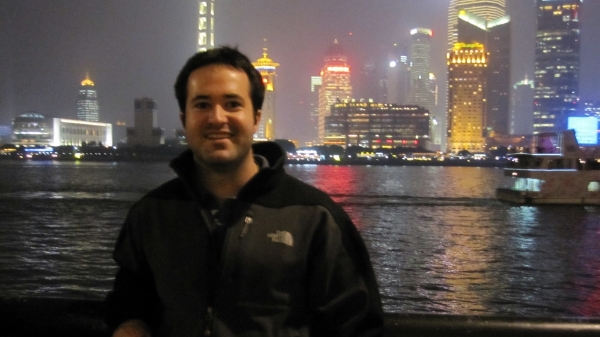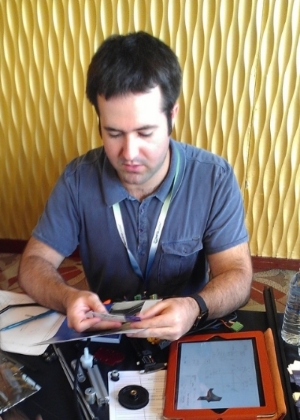
There is something to be said about being at the right place at the right time, which might explain the fortuitous meeting on the other side of the globe that led to Andrew Boggeri joining Hatch International’s Solaii team. A native of the Bay Area in northern California, Boggeri earned a BS in Aerospace Engineering from UCLA and worked in the mechanical engineering field for two years before joining Hatch International’s Solaii project in 2013.
“I like to build things, and help others build things, which was one of the reasons I got involved with Solaii,” Boggeri shares. He met Solaii Director Chandni Shah in China when they were both on a sourcing tour. She gave a short presentation on Vort Port International (now Hatch International) and the India Solar Lamp project (now Solaii), and Boggeri was hooked.
“I follow international politics occasionally and know that there are some complex and thorny issues surrounding nonprofits and development projects,” Boggeri says. “I was very impressed with the integrative approach of Hatch — making sure that communities are involved and building products that they would want and actually use to make their lives better.”
Boggeri’s interest in combating poverty began at a young age. In high school he founded a youth engagement program inside a nonprofit that assists the poor and homeless. He began as a regular volunteer serving food in their kitchen, but then stepped up to a leadership role when realized there was a major need for helpers and coordinators. Since many of the high schools in the area required community service hours, he was able to recruit other volunteers and organize a schedule for students to serve food on the weekends as well as help with other projects doing such things as building maintenance and fundraising.

“I’ve always had a really strong sense of justice and fairness, and poverty really makes people vulnerable and shouldn’t be a state in which person has to suffer,” Boggeri explains. “If you grow up in a poor rural village, or on the streets of a third-world country, you’re starting off life at a huge disadvantage. I want to empower people to be able to choose their own destiny.”
Boggeri’s current volunteer role is as the manufacturing advisor for Solaii, where he works with the other engineers to make sure their designs are manufacturable and gives them advice keeping costs down or achieving certain performance goals. He has experience working in both the US and China, which enables him to provide guidance to the team as they search for manufacturers. He anticipates devoting significant time managing the logistics of production of the solar lamps in the near future.
“I go to China regularly for business, and while I don’t think it’s necessary to see a factory before starting a relationship, at some point you want to visit. It’s important to have a personal relationship with your factory so you know their capabilities and they know that you’re a serious buyer.”
Solaii is planning to make a few design changes to the solar lamps and then send some pilot prototypes into the field for testing. Once the testing has verified the design, production will begin.

“Right now we just need to get through the testing phase with our Indian partners -- this part is a little challenging because good prototypes are expensive, and we want to make sure they’re impressed with the product.”
Boggeri has high expectations for the Solaii project, and hopes for it to develop into a sustainable business that can grow within India before eventually being handed off to local stakeholders.
During his time away from Hatch (i.e. his day job!), Boggeri works as the lead mechanical engineer at FSL/FSL3D, a startup in Las Vegas that makes laser cutters and 3D printers. He also manages a meetup group dedicated to helping folks found and run hardware startups. And in his free time he enjoys hiking and cooking.
Hatch International’s Solaii team’s goal is to distribute solar lamps and empower women by helping them start their own social enterprises, which will increase the economic potential of their community while also reducing the environmental and human health hazards of kerosene lighting. Learn more about the Solaii project by reading how we are Redefining the 6 p.m Hour.
This blog post was written by Susan Patterson, Communications Director for Hatch International.